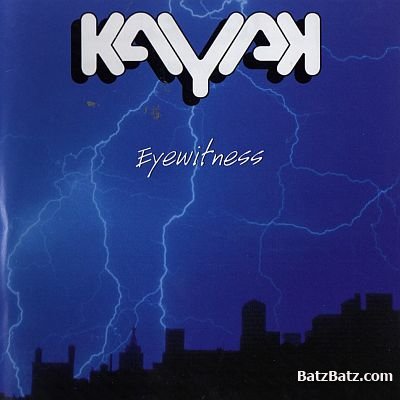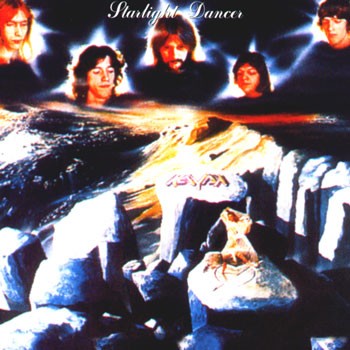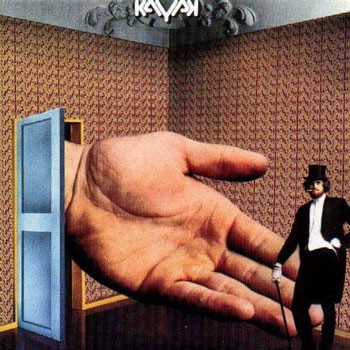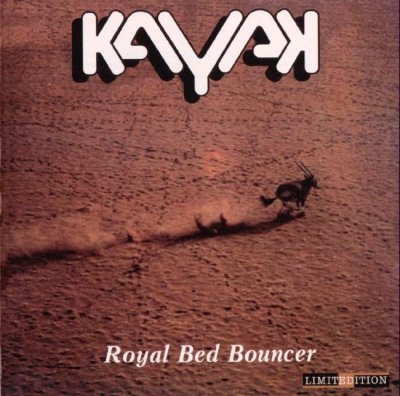![Kayak - See See The Sun [Limited Edition, Remastered] (1973) Kayak - See See The Sun [Limited Edition, Remastered] (1973)](https://i.ibb.co/M83cvnG/Kayak73-See-See-The-Sun-500.jpg)
Year: 1973 (CD 1995)
Label: Pseudonym Records (Holland), CDP 1024 DD
Style: Progressive Rock, Art Rock, Rock
Country: Netherlands
Time: 52:53
Format: Flac Tracks 16/44,1 kHz
Size: 321 Mb
Еще до создания "Kayak" будущие участники ансамбля Тон Шерпензеел (клавишные, бас), Пим Коопман (ударные, гитара) и Йохан Слагер (гитара) пересекались между собой в группах "Balderdash" и "High Tide Formation". После распада "HTF" троица под разными именами записывала демки и выступала живьем, а когда к ней присоединились вокалист Мак Вернер (его Тон и Пим встретили в своей музыкальной академии) и басгитарист Сеес ван Леювен, то коллектив наконец-то обрел свое долговечное имя. С самого начала "Kayak" позиционировались как супергруппа, поэтому музыканты могли выбирать мажорные лейблы, и когда у них не заладилось дело с "Phonogram" (фирма пыталась навязывать группе исполнение чужих вещей), они перезаключили сделку с "EMI". Два первых альбома дали ансамблю три скромных хита ("Lyrics", "Mammoth", "Wintertime"), но что более важно, заставили запомнить "Kayak" как молодую талантливую группу с прогрессивными наклонностями. В 1974 году Сеес понял, что комбинировать учебу в универе с гастролями и студийными посиделками становится все труднее, и принял решение покинуть команду. Его место занял Берт Вельдкамп, с которым был записан диск "Royal Bed Bouncer".
Если на двух первых работах над композициями трудился тандем Пима и Тона, то на этом альбоме, принесшем еще один небольшой хитец "Chance For A Lifetime", во всю композиторскую мощь развернулся один Шерпензеел.
Усердно гастролируя, к 1976 году "Kayak" сделались одними из лидеров сцены Бенилюкса. За это время музыканты успели рассориться с менеджментом, в результате чего покинули "EMI" и вернулись на когда-то отказавший им "Phonogram". На альбоме "The Last Encore", совместившем влияния "Yes", "Supertramp" и "Queen", Пим и Тон воссоединились как авторский дуэт, но тем тяжелее для группы оказалась отставка барабанщика (он ушел по причине одолевавшей его астмы и переключился на более спокойную продюсерскую работу). Спустя пару месяцев отчалил и Берт, однако к концу года ритм-секция была восстановлена с помощью Чарльза Шаутена и Тео де Йонга. Одновременно с обновлением состава "Kayak" решили поднять продажи дисков и с симфо-прога ушли в радиодружественный поп. И действительно, в коммерческом плане "Starlight Dancer" укрепил позиции группы, и титульный трек (по иронии судьбы самый прогрессивный на альбоме), прочно застрявший в классическом репертуаре, достиг 14-й строчки голландских чартов.
Некоторый успех поджидал команду и за океаном, где вышла пластинка с таким же именем (на самом деле компиляция из "The Last Encore" и "Starlight Dancer"), однако американской публике больше понравилось диско "Want You To Be Mine" (№ 55 в "Billboard"). Перед ансамблем маячило настоящее международное признание, когда разборки между старичками и новичками опять оставили "Kayak" без ритма. Тем временем оказалось, что Вернера больше не прельщает пение, поскольку ему всегда хотелось побарабанить, и он был не намерен вторично упускать шанс посидеть за ударной установкой.
Коллеги, увидев, что уговаривать его бесполезно, объявили кастинг на образовавшуюся вакансию, и в результате главный микрофон отошел к Эдварду Реекерсу. Тон также привлек к делу родственников – бас отдал брату Петеру, а на бэк-вокал вместе с Катериной Лапторн привел свою жену Ирен Линдерс (она тогда писала еще и тексты). Как по составу, так и по музыке новый "Kayak" был далек от старого, и давние поклонники группы с недоумением слушали балладно-ориентированный пиано-рок "Phantom Of The Night". Тем не менее, именно этот альбом дал команде гораздо более широкую аудиторию – домашний тираж пластинки превысил 100000 копий (по голландским меркам очень солидный результат). Диск возглавил национальный чарт, а сингловый медляк "Ruthless Queen" протаранил горячую десятку (№ 4).
Следующий студийник, записанный в Лос-Анжелесе, был выдержан в похожем стиле, но ему не хватало яркого хита, да и эффект сюрприза отсутствовал, поэтому успех оказался поскромнее (хотя все равно "Periscope Life" продавался лучше первых четырех альбомов). Вдоволь наигравшись с коммерцией, "Kayak" развернулись к оригинальному симфо-прогу и записали пластинку "Merlin" с историей о легендарном средневековом волшебнике. Несмотря на то, что данный альбом наряду с "Royal Bed Bouncer" был признан одной из сильнейших работ группы, продажи дисков падали, и финансовое положение сильно ухудшилось, что только подогрело непрекращающиеся внутренние междоусобицы. В то время как Вернер выдал сольный чарттоппер "Rain In May", "Каяк" уверенно шел ко дну под собственным весом. Команде даже не помогло избавление от балласта (за борт отправились обе бэк-вокалистки), и попытка сделать студийный лайв "Eyewitness" с треском провалилась. Радикально перетряхнув кадры, Тон пытался и дальше гастролировать под маркой "Kayak", однако непрекращающиеся конфликты с менеджером привели к смене вывески на "Europe", а потом и к окончательному роспуску группы.
Вспомнили про затонувший проект 17 лет спустя, когда его альбомы стали переиздаваться на CD. Сначала ансамбль промелькнул на ТВ, потом состоялись пробные концерты, и наконец дело дошло до свежих записей. В 2000 году воссоединившиеся Тон, Пим, Макс и Берт (плюс гитарист Роб Винтер) выдали мощный прог-альбом "Close To The Fire", безмерно порадовавший старых фанатов. Их особое восхищение вызывал тот факт, что Вернер вновь находился у микрофона, однако восторги по данному поводу быстро сошли на нет. Уже в сопутствующем туре часть вокальных обязанностей Мак делегировал Берту Хееринку, а после гастролей вообще выбыл из игры. Пополнив штат поющим гитаристом Робом Вундеринком, "Kayak" поплыли дальше, однако альбом "Night Vision" выглядел бледнее своего предшественника. Тогда музыканты бросили взгляд в прошлое и, взяв за основу программу 1981 года, сделали из нее рок-оперу. Несмотря на то, что по ходу дела пришлось решать кадровые проблемы и искать новую рекорд-компанию, проект оказался удачным, и выход "Merlin - Bard Of The Unseen" сопровождался успешным туром, проходившим в сопровождении симфонического оркестра. Почувствовав свою сильную театральную сторону, "Kayak" продолжили работать в данном направлении и спустя пару лет выдали еще более амбициозную рок-оперу "Nostradamus - The Fate Of Man". После релиза отбыл Хееринк, однако текучка кадров на этом прекратилась, и штатное расписание теперь выглядело так: Шерпензеел (клавишные), Реекерс (вокал), Вундеринк (гитара, вокал), Йоост Вергооссен (гитара), Синди Оудшоом (вокал), Ян ван Ольффен (бас), Коопман (ударные).
(rockfaces.ru/k/kayak.htm)
01. Reason For It All (06:30)
02. Lyrics (03:44)
03. Mouldy Wood (05:17)
04. Lovely Luna (08:21)
05. Hope For A Life (06:50)
06. Ballet Of The Cripple (04:40)
07. Forever Is A Lonely Thought (05:27)
08. Mammoth (02:59)
09. See See The Sun (04:14)
10. Still Try To Write A Book (Bonus) (02:02)
11. Give It A Name (Bonus) (02:44)
![Kayak - See See The Sun [Limited Edition, Remastered] (1973) Kayak - See See The Sun [Limited Edition, Remastered] (1973)](https://i.ibb.co/zsdTjht/Kayak73-See-See-The-Sun-01.jpg)
![Kayak - See See The Sun [Limited Edition, Remastered] (1973) Kayak - See See The Sun [Limited Edition, Remastered] (1973)](https://i.ibb.co/4S2tgSG/Kayak73-See-See-The-Sun-back.jpg)
![Kayak - See See The Sun [Limited Edition, Remastered] (1973) Kayak - See See The Sun [Limited Edition, Remastered] (1973)](https://i.ibb.co/B4QDHQG/Kayak73-See-See-The-Sun-back-in.jpg)
При желании можно посмотреть все мои публикации на сайте. Приятного прослушивания. Жмём и смотрим (Click to see all of my posts)!
KatFile
TurboBit
GigaPeta
Новость отредактировал LynyrdSkynyrd - 6-02-2022, 17:58
Причина: Обновил ссылки и описание.










1 комментарий